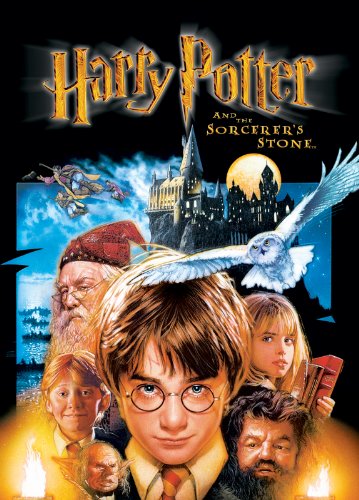 The eagerly anticipated penultimate chapter in the Harry Potter movie series, Harry Potter and the Deathly Hallows, Part I, opens November 19th in the U.S. (it premiered earlier this week in London), so I thought it might be fun to look back at the previous films to see how they were received in the media when they first opened.
The eagerly anticipated penultimate chapter in the Harry Potter movie series, Harry Potter and the Deathly Hallows, Part I, opens November 19th in the U.S. (it premiered earlier this week in London), so I thought it might be fun to look back at the previous films to see how they were received in the media when they first opened.
Harry Potter and the Sorceror’s Stone (2001) — Although this was the first film in the series, there was already significant buzz surrounding J.K. Rowling’s story of the boy wizard. By the time Sorceror’s Stone premiered in theaters in the U.S. on November 16, 2001, Harry Potter and the Goblet of Fire had already been in bookstores for over a year, so fans had to go back a few volumes to revisit how Harry’s story began. And they did — Sorceror’s Stone became the highest-grossing film of 2001, making over $300 million at the box office.
Director Chris Columbus, known for such family-friendly films as the two Home Alone movies and Mrs. Doubtfire, created a fairly faithful adaptation of the popular novel. In an interview in Time magazine, he defends the decision to follow the book as closely as possible. “Fans would have been crushed if we had left too much out. My mantra has been, kids are reading a 700-page book. They can sit through a 2 1/2-hour movie.”
Roger Ebert of the Chicago Sun-Times called the movie “an enchanting classic that does full justice to a story that was a daunting challenge.” Daniel Radcliffe is a convincing Harry Potter, “the embodiment of every reader’s imagination,” according to Bob Graham of the San Francisco Chronicle. “It is wonderful to see a young hero who is so scholarly looking and filled with curiosity and who connects with very real emotions, from solemn intelligence and the delight of discovery to deep family longing.”
However, in his review for the New York Times, Elvis Mitchell thinks the film follows the original story too closely. “A lack of imagination pervades the movie because it so slavishly follows the book. The filmmakers, the producers and the studio seem panicked by anything that might feel like a departure from the book — which already feels film-ready — so [the movie] never takes on a life of its own.”
Claudia Puig of USAToday agrees, saying the film lacks the whimsy and the verbal humor of Rowling’s original story. “Rowling wrote a book that’s clever and witty, as well as scary, fanciful and sometimes sad,” Puig said, “but not enough of that emotional range ends up on the screen.”
Some saw the film as a much-needed escape from then-recent events. Peter Bradshaw of the Guardian wrote the film made him nostalgic — “not for boarding schools, C.S. Lewis or Angela Brazil, but for the old-fashioned pre-September 11 cultural news event. In those innocent days, giant global phenomena for the west sprang from the culture industry…and their newsworthily disruptive implications could be chewed over in the knowledge that our peace and plenty were essentially undisturbed.” We could be excited about a movie, without the threat of terrorism lurking in the background.
Next up, a look at Harry Potter and the Chamber of Secrets.
(NOTE: An account is required to read some articles at the New York Times website. Registration is free, and well worth the time).
